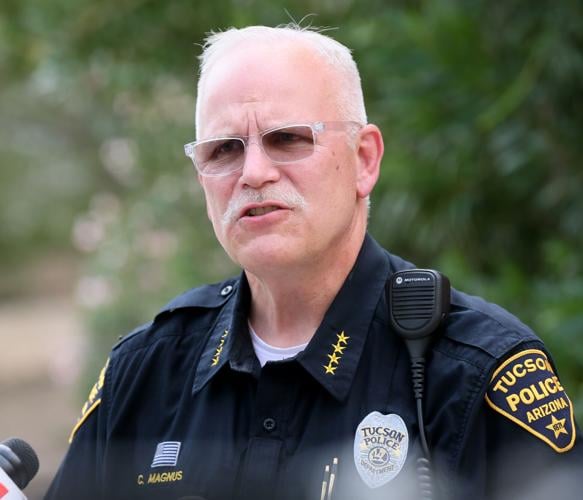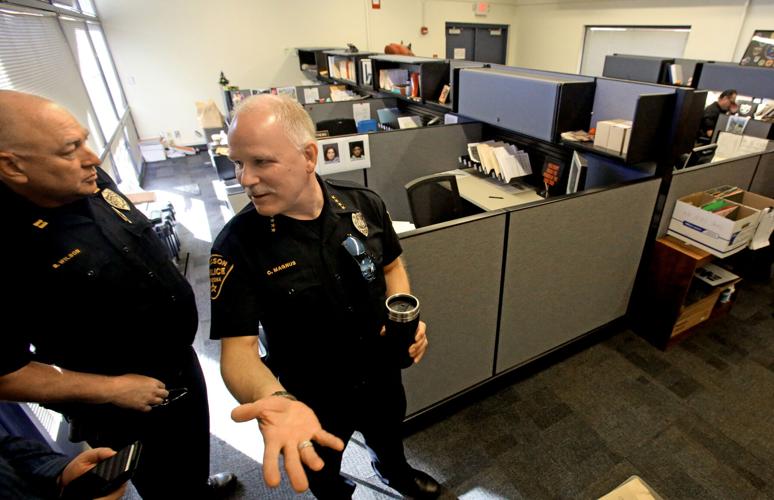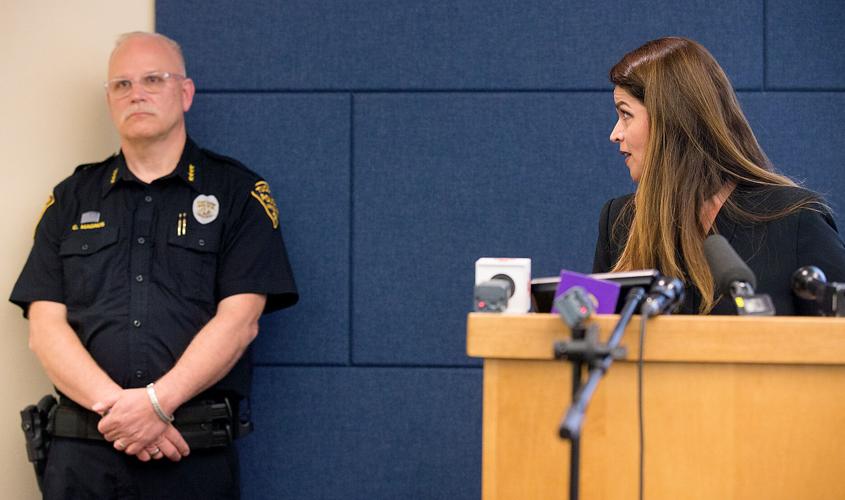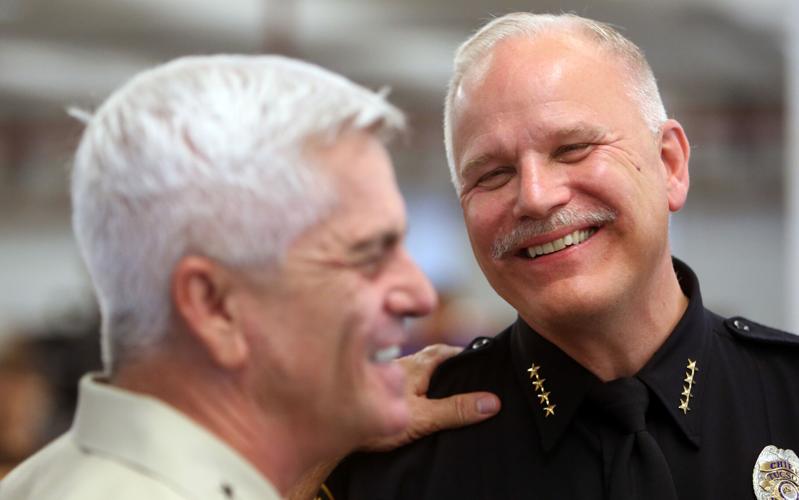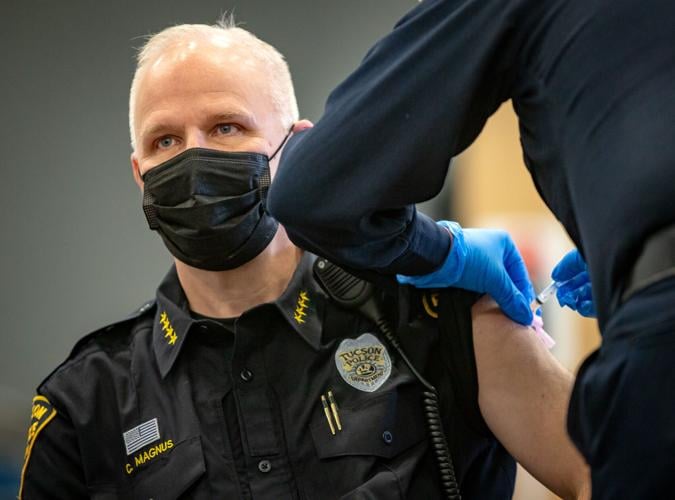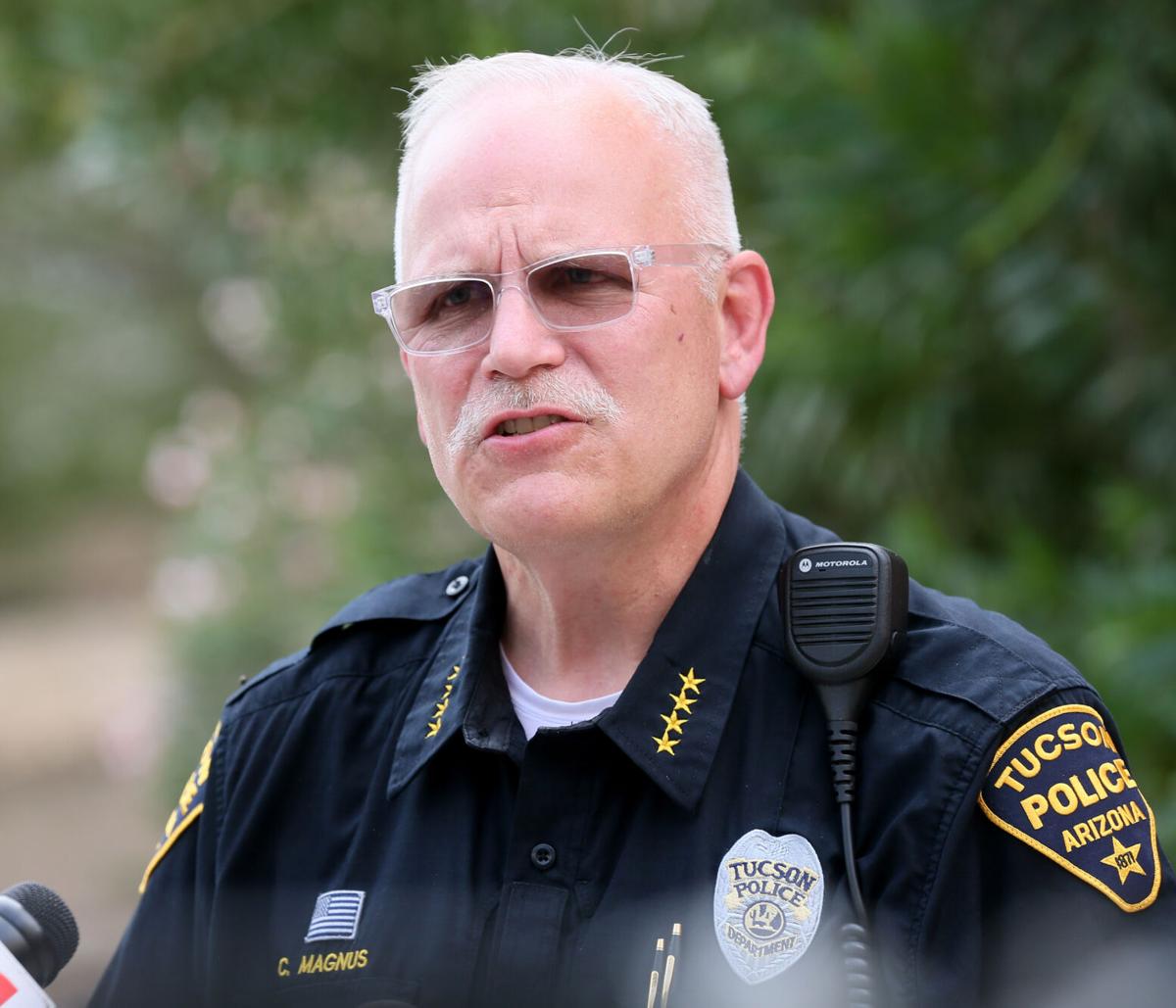Chris Magnus is moving to Washington, D.C., for his new job as head of U.S. Customs and Border Protection, and while he's proud of the work the Tucson Police Department did while he was its chief, he said he's seriously concerned about the shrinking number of officers on the force.
The Tucson Police Department underwent a myriad of changes under Magnus, who resigned as chief on Tuesday after the U.S. Senate confirmed his appointment by President Joe Biden to head CBP on a 50-47 vote.
These included changes to the use-of-force policy, multiple programs that provide alternatives to arrest, enhanced pay and wellness benefits for officers, a nationally recognized review process for major incidents.
"These are collaborative efforts of what I consider to be a really outstanding executive leadership team within the department, and they also involve a lot of other department members," Magnus said. "These are some of the best people I've ever worked with."
At the same time, however, Magnus has had to deal with a shrinking force that's led to reduced law enforcement in some areas, record-high homicide rates with no clear-cut prevention strategies available and a change in societal views on policing.
Before flying off to D.C. for his first swearing-in ceremony on Friday, Dec. 10, with a more formal ceremony set for January, Magnus sat down with the Arizona Daily Star on Tuesday to talk about his highs and lows with TPD, how he came to embrace progressive policing and his hopes for the department going forward under his successor.

Tucson Police Chief Chris Magnus, right, and Capt. Bob Wilson, the division commander at the TPD Santa Cruz substation, walk through the under-sized room for detectives during a tour prior to a bond election.
The City Council promoted Chad Kasmar from deputy chief to police chief that day, a move Magnus praised, saying, "He's so ready to take the reins."
Use-of-force and accountability
Magnus said his last few weeks as chief were some of the most difficult of his nearly four-decade career in law enforcement, with the conduct of two officers coming into question after separate use of force situations, one of them fatal.
On Nov. 14, an off-duty TPD officer took two women to the ground during a dispute in a restaurant parking lot.
Two weeks later, another off-duty officer shot and killed a 61-year-old man in an electric scooter at a Lowe's store. The man had brandished a knife but had his back to the officer when he was shot, police said. The officer, Ryan Remington, is being fired for excessive use of force.
Both situations are under administrative review and Magnus couldn't comment on them directly in Tuesday's interview, but he acknowledged the issue.
"It's frustrating when you see an example like we did recently where there was little to no de-escalation," Magnus said. "I don't think that's representative of how our cops do their work day-in and day-out. We see them use (de-escalation) over and over again to get peaceful resolution, to make arrests without force and to resolve problems."
The department regularly updates its use-of-force policy based on national models and best practices, and it underwent some major revisions shortly after Magnus became chief.
"When we put it in place, we were one of the only departments in the country that was this far ahead in terms of addressing provocation, mandatory de-escalation and more. A lot of components of our use-of-force policy were not common," Magnus said.

Tucson Mayor Regina Romero looks back at Tucson Police Chief Chris Magnus after being asked about his resignation during a press conference regarding the in-custody death of Carlos Ingram-Lopez on April 21. Magnus offered his resignation during the press conference on June 24, 2020.
While he sees evidence all the time of officers engaging in de-escalation tactics and good decision-making, "there are some cops that are just simply not good with their de-escalation strategies. It's not their strong point," he said.
In 2020, Magnus offered his resignation over an in-custody death the police department failed to make public when it occurred, but the city manager asked him to stay on the job.
Magnus called the incidents anomalies, saying that even for those who do excel at de-escalation, outside factors can cause an officer with normally good judgement to make the wrong choice.
To that point, officers undergo stress-based training in which they run through scenarios and have to decide under pressure whether they should shoot or not shoot, and where and how to shoot, Magnus said.
"It's frustrating when we have a fail in those areas," he said.
Accountability is critically important, especially in today's climate, Magnus said, and TPD has taken steps in recent years to be more transparent with the community.
Under Magnus' watch, TPD created the Sentinel Event Review Board, made up of community members, subject-matter experts, city government representatives and others to evaluate major events, including use-of-force incidents.
"They look at things from the standpoint of 'how can we do things better in the future? What can we do differently?'" Magnus said. "That's not done most places. People are afraid of lawsuits and they don't necessarily like the public seeing things with that level of detail."
The reviews, which are published online, didn't come from public demand.
"It wasn't like someone said, 'You have to start being accountable in these areas,'" Magnus said. "We were already seeking that level of accountability for ourselves to the community."
Quality of life vs. public safety issues
Magnus was hired to lead TPD in January 2016 after a national search, and, as of 2020, was paid $212,600 a year. He previously served as police chief in Fargo, North Dakota, and Richmond, California.
Before becoming a police officer in 1985, Magnus spent time working in related fields, first as a dispatcher and then as a paramedic. He says these experiences helped shape his views on policing as it pertains to issues like substance use disorder and mental health issues.
"You can't have public safety without public health. They're inextricably combined if you want to be effective," Magnus said. "I was a paramedic for 10 years even while I was doing policing, and experiences even within my own family and circle of friends have helped me appreciate that this is a field that has to constantly evolve. You have to be willing to experiment with new things. You have to reward and encourage people who are willing to reach out and do something that is really outside of the box."
When he first arrived, he said, officers who were trying to address problems in a nontraditional way almost felt like they had to hide. Now, the climate is one that rewards new ideas and community engagement, he said.
"There are a lot of things that I think put us well ahead of the curve and are very important when it comes to accountability, engagement and training, and they're things that lead to a healthier organizational culture," Magnus said.
"Organizational culture isn't something that you just snap your finger and it changes. It's not as easy as one program, or a bunch of policies or training or supervision. It's a lot of things that all come together to gradually change how cops work and feel about their jobs and engage with the community."
During his tenure, TPD developed what he says is the nation's most comprehensive pre-arrest drug deflection program; expanded its Mental Health Support Team; and created a Homeless Outreach Team that works with nonprofits, neighborhood groups and outreach specialists from the city.
The department also developed a program that uses data to identify children exposed to repeated domestic violence incidents, so officers can engage with those children and try to help break the cycle of violence.
"A lot of these programs that provide alternatives to arrest, and engage with populations, have such an impact on policing, on public safety, and on the humanity required to do effective policing," Magnus said. "We've been really bold in trying to greatly expand this deflection (from arrest) approach by all our patrol officers."
It's part of the larger idea that an arrest isn't the solution to every problem.

Tucson Police Chief Chris Magnus receives the Moderna COVID-19 vaccine at a clinic at the Tucson Convention Center.
"We've really gone a long way to encourage the use of other tools that go beyond arrest," Magnus said. "People who have drug and mental health problems, mental health problems and homelessness problems, those problems are fixed through treatment and access to services."
City officials and others have talked for some time about creating nonpolice programs to address such quality-of-life issues, but for now, it's police who are still handling the bulk of those situations 24/7.
"I think we're doing more of that in more thoughtful and creative ways than most departments," Magnus said.
Using data to make a difference
Another point of pride for Magnus is the creation of the department's analysis division and its CompStat360 approach to tracking and analyzing crime, neighborhood problem-solving, community satisfaction and internal agency issues.
CompStat360 is a program that takes a holistic approach to crime reduction, looking at more that just crime data, but also city demographics and trends, community perceptions, and areas such as officer wellness.
"When I got here, I was shocked to find that for a city this size, we had no meaningful section of the department assigned to crime analysis," Magnus said. "That was a real fight (with the city.) It took almost three years to get the authorization and resources."
Now, the department has a nine-person team, including Ph.D.-educated and other advanced-degree holding members who track crime data, analyze patterns and support the CompStat360 program.
"It's more than just holding people accountable for crime data. It's about problem solving that involves not only different segments of the department working together, but also different components of city government, neighborhoods and others working together to tackle particular problems, some major and some small."
Some of the problems have been traffic-related, some involved quality of life or crime issues, but the idea is to move beyond taking a one-dimensional approach to dealing with issues.
While the data tells one story, the experiences of community members who are affected by TPD's work are another key part of the story. TPD is working to survey victims about the department's services, encouraging them to be candid about the level of service they received.
"We've come so far with the analysis function in our agency, and I think that's so key when you have limited resources, which we have," Magnus said. "When you can inform what you do with data, you're so much further ahead. You're not wasting time putting the resources in places where it's not constructive."
Record-setting year for homicides
Magnus said he wishes that data analysis could assist in preventing the homicides that are occurring at a record-high rate in Tucson. As of Dec. 9, Tucson had recorded 92 homicides in 2021.
"They're all over the map, the reasons for them don't fall into any one convenient category," he said. "If they were all gang-related, there are strategies for gang-retaliation homicides and they work. That would be great, but a fairly small number of ours are gang-related."
The same rings true for drug- and domestic-violence related homicides, some of which, but certainly not all, can be prevented through intervention strategies, he said.
"A lot of them, let's face it, are disputes between parties that are completely unpredictable and therefore not necessarily preventable, and of all kinds and in all places throughout the community," Magnus said. "This is one of our greatest frustrations, and we're far from alone. There are many other cities experiencing these same kinds of dramatic increases over the past two years."
In 2020, there were 68 homicides in Tucson — the highest number in a decade — and in 2019, TPD investigated 50 homicides, a reduction of nine from 2018.
Where Tucson does differ from other jurisdictions is in its 85% clearance rate — the percentage of homicides closed by arrest, or for which a suspect has been identified but can't be arrested due to circumstances beyond the department's control. Magnus called that rate "astoundingly high" and "simply unheard of" in most places.
He credits the clearance rate to hard work by TPD's detectives, but also to the relationships officers have with the community.
"No matter how good your cops or detectives are, you have to have that relationship with the community if you're going to get information to solve homicides," Magnus said.
Recruiting, retention and future of policing
In addition to advocating for two pay increases for officers and a raise for community service officers, Magnus and the executive team worked to address the issue of employee departures, saying TPD needs to at least offer pay equitable to other law enforcement agencies in the state.
"My concern is that that's one of those things that you have to keep on it, because other places are continuing to increase their compensation," Magnus said.
Under the city budget, TPD still offers lower starting pay than several agencies in nearby jurisdictions, including Queen Creek, which pays officers a starting salary of $58,698. Starting salary in TPD is $54,516, according to the department's website.

Tucson Police Chief Chris Magnus, right, shares a laugh with Pima County Sheriff Chris Nanos at a press conference announcing the start of a public awareness campaign for Look! Save A Life.
In addition to the lack of pay parity, social factors also play a part in the police department's difficulty in hiring.
"You have to be really purposeful in your recruiting and retention efforts," Magnus said. "When you set it aside, especially in the climate we're in, all of a sudden you're in this crisis position." Trying to catch up becomes an "insurmountable task."
In February, TPD projected the force would drop to 769 officers by January 2022, but the number has already dipped below that. Currently, TPD has 760 sworn officers.
In January, there were 813 sworn officers in TPD's ranks, and in January 2020, there were 853.
Magnus said TPD's shrinking force is his biggest concern as he leaves. Officers no longer respond to a variety of calls, including traffic accidents in which no one is injured, noncriminal homeless activity on public property, minor noise complaints, panhandling, requests for welfare checks and suicidal subjects who are not a threat to others.
Magnus said earlier this year the department would also phase out police response to more situations, including calls about contraband at schools, hospitals and courts; deaths at medical care facilities; reports of city bylaw violations; financial crimes; and runaways.
The shift in cultural perception toward law enforcement, added to market forces, has made it difficult to recruit, he said. That makes things like equipment and benefits critical when it comes to hiring quality applicants.
Under Magnus, the department has emphasized employee wellness, not only for retention, but also to address the increasing demands of the job. After years of pushing for it, TPD is finally getting approval and funding for departmentwide mandatory annual mental health checks, he said.
The department has also developed a program to help officers after traumatic incidents, which teaches officers tools to assist in their mental health that they then pass along to others. Taking care of employees is one way to ensure they don't burn out, but also helps the department attract the right kind of applicants, Magnus said.
"This is not just any other police department. We are a very problem solving-focused department and we want people who want to engage with the community in nontraditional ways," he said. "But to convey that message requires its own distinct marketing campaign which costs money. You can't just expect people to come to you."
Proposition 101, which went into effect in July 2017 and raised the city sales tax from 2 cents per $1 to 2½ cents per $1 in an effort to raise $250 million for the police and fire departments by 2022, was a game-changer, providing new vehicles and equipment for hundreds of police officers, Magnus said.
"One of my hopes for this community is that they will recognize that this need for public safety resources is not a one-and-done kind of deal. It needs to be ongoing," Magnus said, noting that Proposition 101 will soon expire.
The department has embraced the idea of taking some social work out of the hands of police, but for now, officers are still the primary responders.
"Rhetoric around this issue is one thing, but actually having a system in place where there are alternative resources to these types of calls is a whole other thing," Magnus said. "For the near-distant future, we do not have meaningful alternatives to the police in a whole host of areas, and it's not because the police are resistant to it.
"We are more than anxious and excited about having those alternatives in place and will do everything we can to support that initiative."
Photos: Tucson Police Chief Chris Magnus

New Tucson Police Department Chief Chris Magnus smiles and laughs during his swearing-in ceremony on March 30, 2016, at the Westside Police Service Center, 1310 W. Miracle Mile, in Tucson, Ariz. Magnus comes to Tucson from the Richmond Police Department in California.

Tucson Police Chief Chris Magnus, during a press conference discussing proposed changes to the department, March 9, 2016.

Judge Philip Espinosa, left, delivers the oath as new Tucson Police Department Chief Chris Magnus, right, is sworn in at the Westside Police Service Center on March 30, 2016.

New Tucson Police Department Chief Chris Magnus, left, is pinned by his husband Terrance Cheung, right, during his swearing-in ceremony at the Westside Police Service Center on March 30, 2016.

New Tucson Police Department Chief Chris Magnus, left, shakes hands with Tucson mayor Jonathan Rothschild at his swearing-in ceremony on March 30, 2016.

Tucson Police Chief Chris Magnus talks with Pima County Sheriff Chris Nanos at a press conference announcing the start of a public awareness campaign for Look! Save A Life on Oct. 7, 2016.

Chris Magnus welcoming a new officer to the force from the Southern Arizona Law Enforcement Training Center's graduation class 17-4, February 1, 2018.

Pima County Sheriff Mark Napier and Tucson Police Chief Chris Magnus talk following a domestic violence awareness presser at the Tucson Police Department headquarters, Oct. 1, 2019.

Tucson Police Department Chief Chris Magnus answers questions from the media about a $2 million federal grant that will offer aid response to sexual assault cases after a press conference at the Pima County Attorney's office, 32 N. Stone Ave., Tucson, Ariz. on October 8th, 2019.

Tucson Police Chief Chris Magnus, left, and Tucson City Mayor Regina Romero during a press conference regarding the in-custody death of Carlos Ingram-Lopez on April 21. Magnus offered his resignation during the press conference on June 24, 2020.

Tucson Police Department Chief Chris Magnus receives the Moderna vaccine at a Coronavirus (COVID-19) vaccine clinic at the Tucson Convention Center on Jan. 15, 2021.

Tucson Police Chief Chris Magnus, right, thanks Andrew Messing, president of Steven M. Gootter Foundation, for the new AED's, which were donated by the Steven M. Gootter Foundation, at Tucson Police Department on June 22, 2021.

Tucson Police Chief Chris Magnus, left, speaks with Mayor Regina Romero after a press conference on July 19, 2021.


